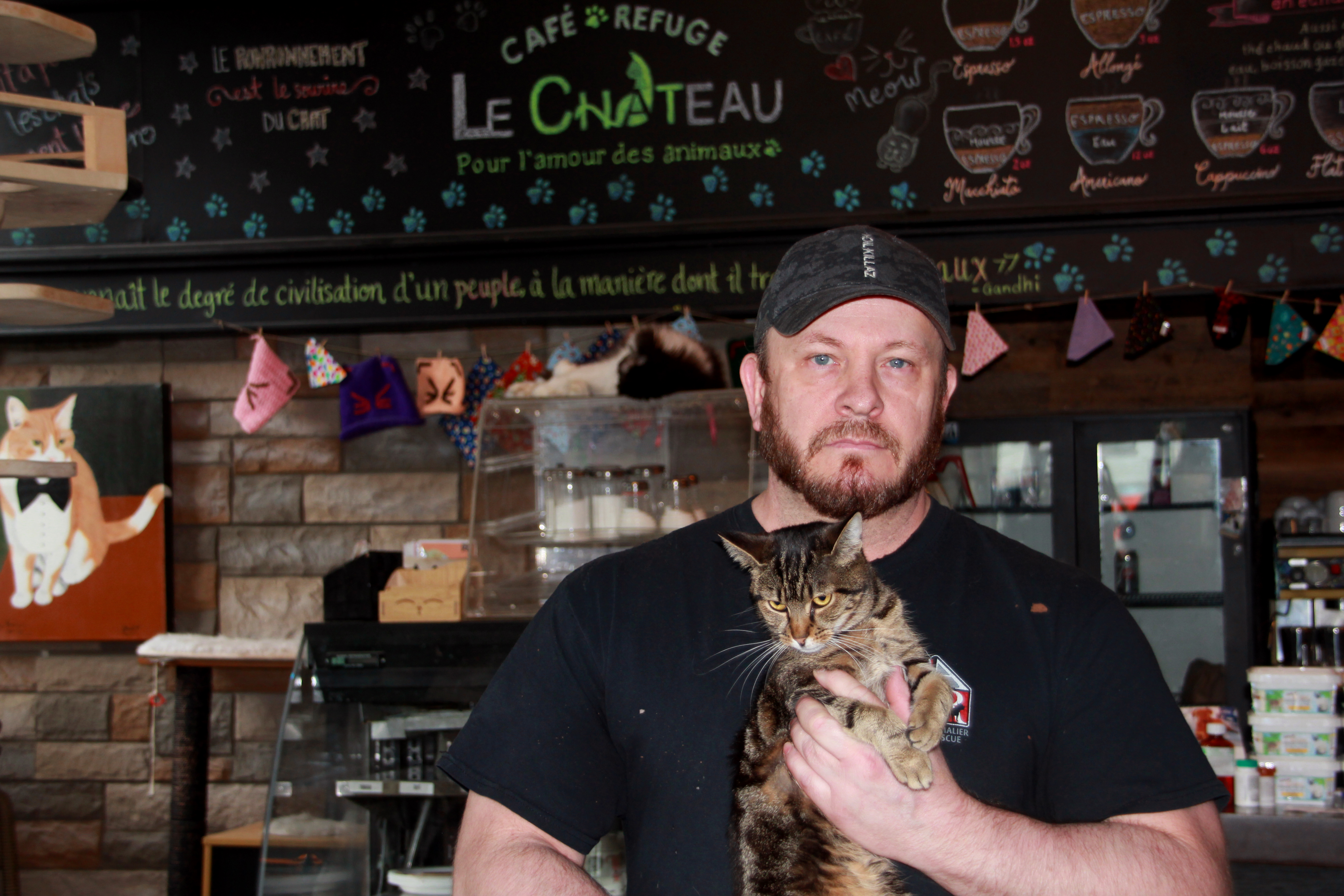
A non-profit feline matchmaker in Quebec’s Eastern Townships has to rely on a GoFundMe campaign to keep the building – and all of its residents – alive.
Refuge Le Château is a shelter in Sherbrooke, Quebec, with over 150 animals to adopt – or have coffee with. It opened its doors in 2015 to welcome abandoned cats; two years later, it became a bustling café with a side-gig in zootherapy.
Claudia Beauregard has reaped these therapeutic benefits since she started volunteering in 2016.
“I didn’t want to live anymore,” said Beauregard, who was in a depressed state and contemplated suicide before discovering the shelter.
“When I discovered the shelter and its resident cats, I felt so welcomed.”
The shelter operates on donations of many shapes and sizes: from cat litter to $7 monetary donations for a hot beverage and a tour. It usually made between $2000 to $5000 a week. They also had a weekend donations table where people could purchase cat toys and knick-knacks; it generated $180 to $210 a month in revenue.
But it all came to a sudden halt on March 15th.
While coffee isn’t an essential service, the shelter is. The non-profit kept its doors open during the pandemic but has not been able to generate as much profit. The GoFundMe was its first cry for help and a temporary substitute for the cat café, raising $1170 for food, veterinary bills and rent.
Instead of stopping for drinks with a furry friend, guests must now take their chances with day-by-day adoption appointments – but they don’t generate any revenue. The cost of adopting a cat, about $80 to $200, covers veterinary bills and sterilization.
Provost said that “Corona adoptions” have the phone ringing nonstop and they can’t keep up because there is a lack of volunteers at the shelter. Before COVID-19, they had, on average, 30 volunteers – now they have 10.
This means the shelter is only open weekends, limiting the number of donations and purchases. Provost suspects they have lost $50 to $60 thousand donations since COVID-19.
“People love to give things like cat food but we don’t have a lot of monetary donations,” said Provost. “If the building owner didn’t help, the shelter would be gone.”
Ernan Haruvy, a marketing professor at McGill University, says charities should expect a decrease in donations due job insecurity. But he’s not worried for them – just the people and animals that depend on the charities.
“The only victims here are the cats,” said Haruvy.
Without volunteers as baristas and tour guides, the shelter had to backtrack to its early days.
Those days, according to Provost, were rough.
In 2018, Provost had to sell his successful T-shirt printing business due to personal bankruptcy. Provost said the he had to invest his own money into the shelter to help cover rent and damages. That year, Refuge Le Château was robbed – more than $2000 was stolen. In December 2019, the shelter experienced severe flooding.
“[The shelter’s] internalizing the suffering of the beneficiaries, that’s why they’re in a crisis situation,” said Haruvy.
According to Haruvy, this happens often with charities. Financially, a charity can recover easily from the lack of donations but their personal involvement with the people and animals dependent on their donations leads to a financial crisis.
But with their increasing popularity, it seemed to be finally looking up for Refuge Le Château. The grand opening of the mini-farm would have been this year.
“The more time passes, the worst it seems to get,” said Provost.
But the shelter still has loyal donors – and they are why Provost decided to hold off on becoming a charity.
Provost submitted the application a year ago but doesn’t feel an urgency to become a charity. He had hoped it would attract bigger donors because of tax breaks. According to Haruvy, a designation as a charity could also lead to government grants, allowing the shelter to hire full-time staff and pay for necessities.
But grants, according to Provost are hard to get when your charity is for animals. He says the paperwork is also a lot more tedious and requires a full-time accountant – Refuge Le Château does not currently have these funds.
As of now, everything is volunteer-based save for a few workers. Which means they are ineligible for COVID-19 relief funds.
The shelter is hopeful but doesn’t know when – or if – things will go back to how they once were.
